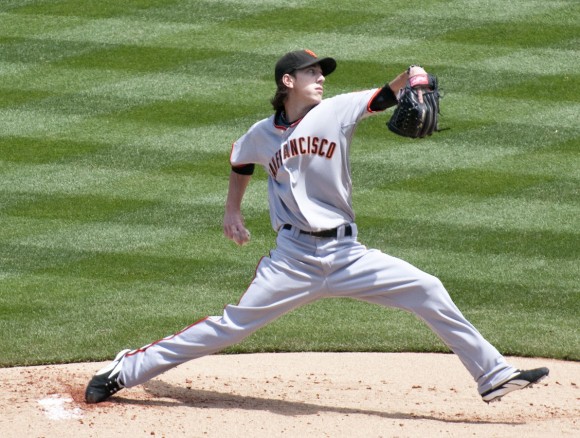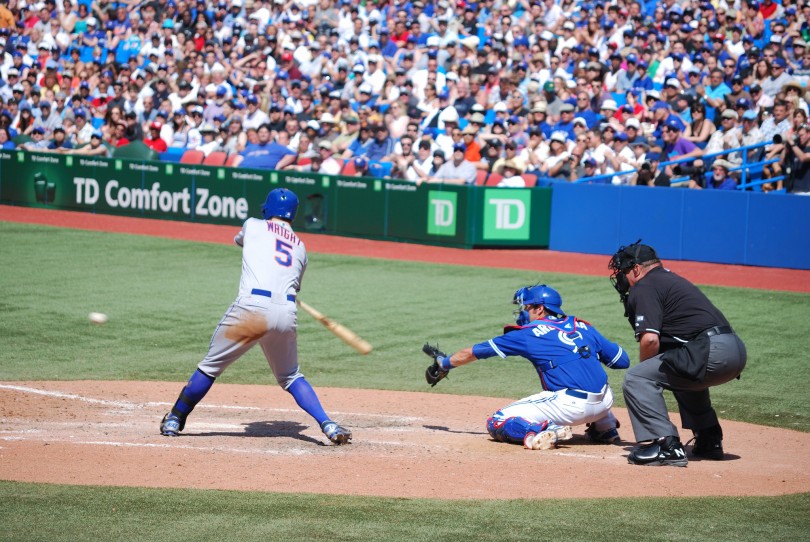aNewDomain — It has become fashionable for many of the so-called “intelligentsia” (read: commentators who are obsessed with statistics) in baseball to declare that “a strikeout is just another out.” The statement implies there’s nothing special about a pitcher who can strike out a lot of hitters, and there’s nothing particularly bad about a hitter who happens to strike out a lot. It maintains that striking out is merely one form of getting put out, and it doesn’t have any more pragmatic effect on the outcome of games than grounding out.
If a strikeout is “just another out,” then how about we posit that a home run is just another hit? That would make just as much sense.
The Argument
Let’s look at this from a hitting perspective. The supporters of the “just another out” concept will say something like this: Take a look at some of the greatest hitters in the game, such as Miguel Cabrera, Mike Trout and Bryce Harper. They all strike out a lot (i.e., on average, more than 100 times per 162 games), but nobody can deny their talent or their big contributions to their teams.
They’ll also tell you that throughout modern MLB history, great power hitters have usually struck out a lot, but that doesn’t get them traded or fired.
Those exemplars are good ones, but let’s look a different kind of baseball player — one who doesn’t have the numbers of a Trout, Cabrera, or Harper.
 Our imaginary player strikes out an average of 140 times per 162 games played. He also draws 50 walks, hits eight or nine home runs, slugs around .400, has a mediocre .320 on-base percentage, doesn’t steal a lot and plays run-of-the-mill defense. Will this guy stay in the major leagues for very long?
Our imaginary player strikes out an average of 140 times per 162 games played. He also draws 50 walks, hits eight or nine home runs, slugs around .400, has a mediocre .320 on-base percentage, doesn’t steal a lot and plays run-of-the-mill defense. Will this guy stay in the major leagues for very long?
The answer, of course, is no.
You see, men who strike out a lot (such as the stars we’ve named), but who continue to remain starting players, even all-stars or MVPs, offset their strikeouts with other huge numbers. They have high OBPs, or high slugging percentages. They produce a lot of runs, or maybe they steal a lot of bases and play stellar defense, too.
Common sense tells us that a player who strikes out a lot and doesn’t have anything special in the way of power, speed or the eye for drawing a boatload of walks is merely a guy who can’t hit!
So, if striking out a lot indicates that a hitter isn’t very good (unless he has positive offsetting traits such as great power), and if the pitchers who are strikeout masters are highly touted and typically the most coveted in the MLB, how can one say that a strikeout is just another out?
Video: MLB Strikeout Montage
A Legitimate List
How does a strikeout differ from other forms of putting a guy out in baseball? I really don’t think it’s difficult to comprehend:
- There’s no chance of a fielding error if you strike out. (Yes, I’m aware of the dropped-third-strike rule, but how often does a guy reach first base safely in that way?)
- A strikeout cannot become a sacrifice fly that scores a man from third base.
- A strikeout does not advance base runners.
- A great strikeout pitcher on the mound is psychologically debilitating to the opposing team’s hitters. Most players feel humiliated if they strike out too frequently. If a pitcher seems “unhittable,” hitters begin flailing at bad pitches or making weaker contact as they overreach.
There are those who will argue that it’s better for a pitcher to try to induce a double play than it is to go for the strikeout. Well, what if there’s nobody on base who can be doubled up? Or, if there is, putting the ball in play always leaves room for error.
It’s important to keep in mind that statistics, whether in life, economics or baseball, are social constructs, not natural laws. A strikeout isn’t merely another out. It’s the worst way of getting put out. Great power hitters and their managers accept this because those guys are likely to get that most special of hits: a home run. But for everyone else, striking out frequently just means they won’t last very long.
For aNewDomain, I’m Brant David.
Images in order: Wright strikeout by James G via Flickr; Tim Lincecum via Wikimedia Commons













